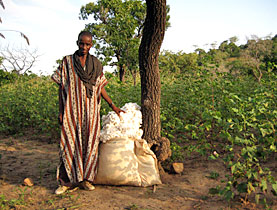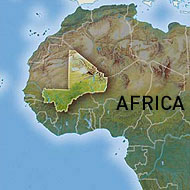
Organic cotton offers hope to Mali farmers

Swiss non-governmental organisation Helvetas has been helping farmers in Mali grow fair trade organic cotton, giving a much-needed boost to community revenues.
A swissinfo reporter witnessed how the project in the poverty-stricken sub-Saharan African country allows people to cultivate cotton without endangering their health by using pesticides.
Hundreds of insects have found a home in the fields around the village of Faragouaran, in the south of Mali. Although annoying, they are largely harmless, according to locals.
“It’s a sign that we do not use chemical products,” says local agricultural engineer Sidi El Moctar Nguiro.
Helvetas, along with Mobiom, a Mali organic association, launched the bio cotton project in 2002 to great success.
“From 174 farmers in 2002 we are now at almost 4,200,” said Nguiro.
As a result the fields have not only become – as in earlier times – an insects’ paradise, but have regained their former fertility. Farmers now have enough to live on and no longer expose their skin and lungs to chemical products.
“It’s foremost an economic project,” explained Frank Eyhorn, from Helvetas. “The scheme offers cotton producers a minimum guaranteed price and families no longer have to get into debt to buy expensive fertilisers and pesticides.”
This year farmers sold their cotton for 238 CFA francs (€0.36 or SFr0.6) per kilo – far higher than the international market cotton price of 160 CFA francs per kilo.
Cotton crisis
Mali relies on its cotton trade, but in recent years international prices have fallen by up to 40 per cent as a result of western countries paying subsidies to their domestic cotton producers.
In the Helvetas project, all the cotton is bought by the scheme’s partners, – among them Swiss firms such as cotton trading firm Reinhart, which one of the largest of its kind, – as well as retailer Migros and textile group Switcher.
These companies sell their products – t-shirts, towels, pyjamas – under the Max Havelaar fair trade label for around ten to 15 per cent more than usual retail prices.
“As well as a minimum price, we offer an extra incentive to producers’ cooperatives – a fair trade prize,” added Vesna Stimac, spokeswoman at Max Havelaar.
The extra funds have allowed the villagers of Faragouaran to build a rainproof organic fertiliser storehouse. “In future, we’d like to finance schools and small water dams,” says village elder Moussa O Samaké with enthusiasm.
Women’s delight
The women of the village are also delighted, and their dancing and singing shows that the project’s success has brought a festive spirit back into the community.
“Since I have been cultivating organic cotton I have enough to live on and can send my children to school,” says Yvette Cissé, a who is around 50 years old – she does not know her exact age.
Women did not fully participate in traditional cotton production, as they had little access to land and credit. The Helvetas project has changed this.
“The number of women active in traditional cotton production was one per cent. We are nearly at 40 per cent,” said Nguiro, who is Mobiom’s technical director.
Hard path
But the organic path has not always been an easy one. New methods require a certain type of equipment, knowledge and a lot of labour.
“At the beginning, many didn’t believe that it was possible to farm without fertilisers and the yields of the first attempts were limited,” remembers Nguiro.
Farmers have been given training on organic farming methods. Some of them, such as Cissé, have even been able to produce as much cotton organically as they did using industrial products.
However, Cissé admits she still has no idea where her cotton ends up. She seems surprised when told of its long journey via the Asian textile industry to Europe.
“It’s enough for me to know that the t-shirts are sold in Switzerland,” she said.
swissinfo, based on an article in Italian by Luigi Jorio in Mali
Mali, one of the world’s poorest countries, is one of the largest cotton producers in Africa, along with Egypt and Burkina Faso, at 650,000 tons in 2006.
In 2002, 174 Mali farmers produced 47 tons of raw bio cotton.
In 2007, the number of farmers had risen to 4,118 and production to more than 600 tons.
Helvetas provides SFr1.1 million ($0.97 million) of funding for the organic cotton project a year.
The Swiss State Secretariat for Economic Affairs (Seco) provides SFr300,000.
Cotton is the most important natural textile fibre in the world. It grows around the seeds of a plant of the Gossypium species. After harvesting the fibre is often spun into yarn or thread and is mostly used to make textiles.
Worldwide 25 million tons of cotton are produced using conventional methods each year, principally in the US, China, India and Pakistan.
The top organic cotton producers (25-30,000 tons per year) are Turkey, India, the US and Syria.
The textile industry is particularly developed in Asia, but it also exists in Europe (including Switzerland). In the 16th-19th centuries the industry was concentrated around the Zurich, St Gallen and Appenzell regions.


In compliance with the JTI standards
More: SWI swissinfo.ch certified by the Journalism Trust Initiative





























You can find an overview of ongoing debates with our journalists here . Please join us!
If you want to start a conversation about a topic raised in this article or want to report factual errors, email us at english@swissinfo.ch.